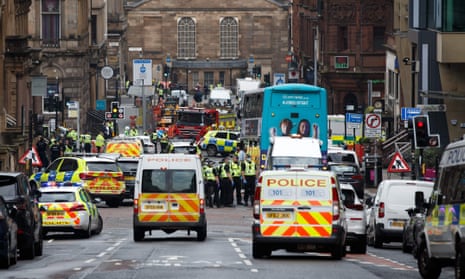At just after 1pm on Friday, the streets of Glasgow city centre – until then quiet as many of Scotland’s lockdown restrictions remain in force – were flooded with emergency vehicles.
Eyewitness footage shows up to a dozen police cars and vans and two ambulances flocking around the Park Inn hotel on West George Street. Spilling out of them were armed police officers, others carrying riot shields and paramedics in full PPE.
They were responding to reports of a stabbing attack at the hotel. A man is thought to have stabbed six people, including a police officer, before being shot dead.
A guest at the hotel described seeing two people lying in the reception area of the hotel. He said both had stab wounds to the abdominal area and one of them was “fighting for his life”.
The man, who gave his name as John and said he was a former police officer, said had been in his hotel room and had been alerted to the incident when he heard calls for help coming from the ground floor.
He said he rushed to the scene and attempted to calm down other residents. He did not see the alleged attacker. He said he believed one of the injured was a Scottish man in his 30s who worked at the reception desk.
Just before 3.30pm, Police Scotland issued a statement saying the incident had been contained and the wider public were not at risk. By late afternoon, the force was saying the incident was not being treated as terrorism.
The hotel is one of six being used to house asylum seekers in the city during the lockdown. Outreach workers expressed their shock at the events. One volunteer who approached the hotel to deliver clothing to a resident was turned away at the police cordon.
The asylum seekers were moved to the hotels en masse by the private housing provider Mears in late April.
In a move condemned by campaigners, their financial support was withdrawn, apparently because the hotels were providing three meals a day, basic toiletries and a laundry service.
Mears had insisted people were being “safely and appropriately” housed, but reports emerged of poor-quality food, difficulties with physical distancing in crowded communal areas, and spiralling mental ill health.
Outreach workers said there was increasing fear, stress and anxiety among this vulnerable population, who had no information about future housing arrangements and no money to top up their phones for communication with lawyers or to buy extra food, hand sanitiser or period products for women.
At the beginning of May a 30-year-old Syrian man, Adnan Olbeh, was found dead in another of the hotels, McLay’s guesthouse.
On Friday night, Mears Group issued a statement saying they were “deeply saddened and shocked” by the events in Glasgow and that their priority was “the welfare of our service users who will no doubt be traumatised by this terrible event”.
Hoshiyar Ahmed, who works with the Kurdish community in Glasgow’s Tolcross, said he had supplied food to the Park Inn residents during Ramadan. He said he was distressed to learn of Friday afternoon’s events.
Ahmed said he had met mainly men of many different nationalities – Iraqi, Iranian, Kuwaiti, Yemeni, Nigerian – at the hotel and in general their mood was low. “They were feeling sad, all negative thinking. Everything was upside down for them. They were unhappy.”
He said they had been pleased to receive the food deliveries. “I know they had complaints about the food during the month of Ramadan, and the hotel didn’t provide any microwave to heat up food after hotel meal times were over.”
On Thursday, Mears’ chief operating officer, John Taylor, announced that the hotel residents would be returning to individual accommodation from next week. At a media briefing, he said all those currently in the asylum system would be housed, adding: “No one is going to be homeless, that is absolutely clear.”
This was welcomed by campaigners after the Home Office said on Wednesday that a pause on asylum evictions had been lifted.
